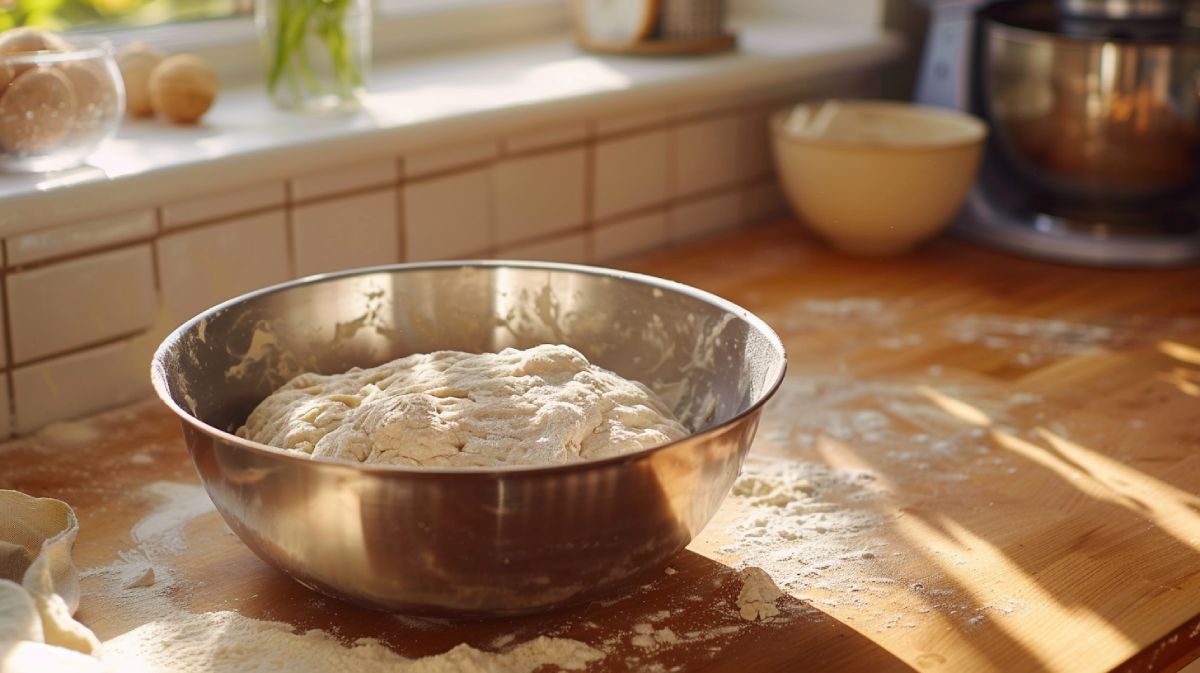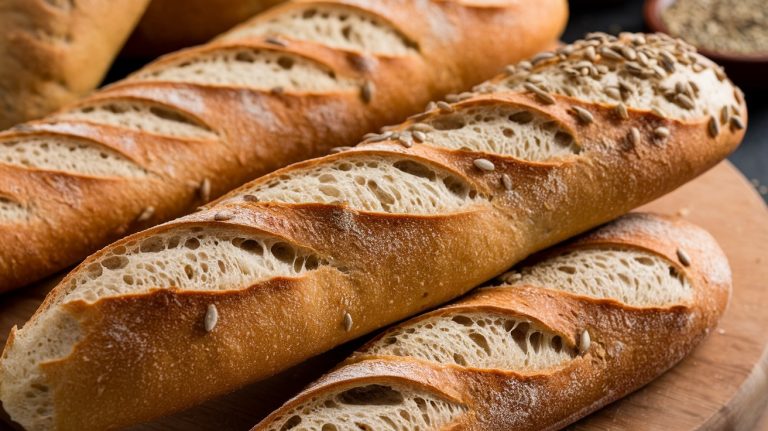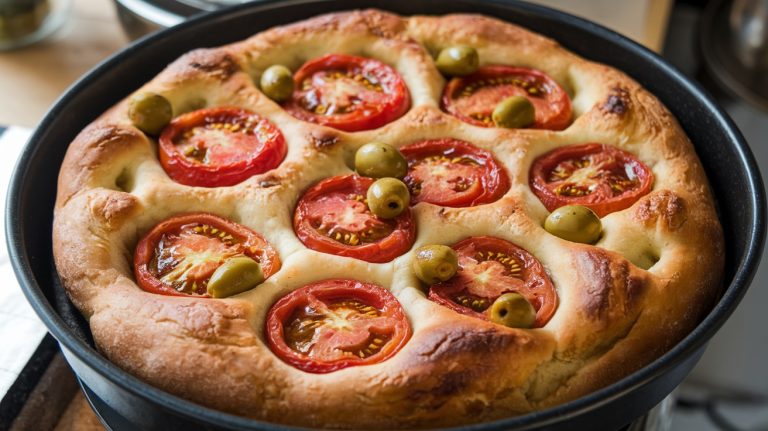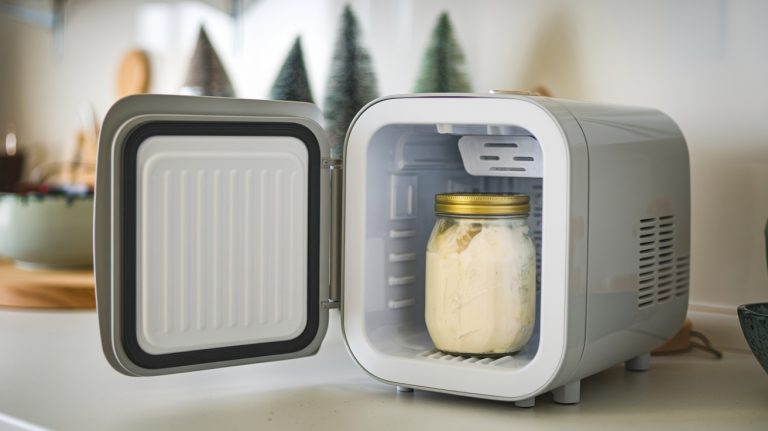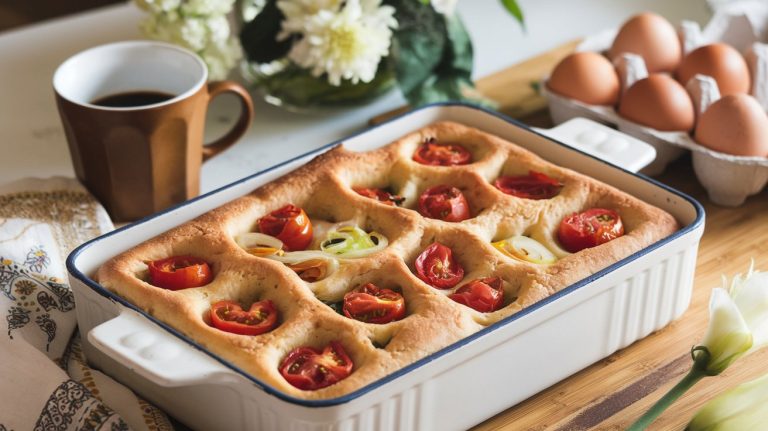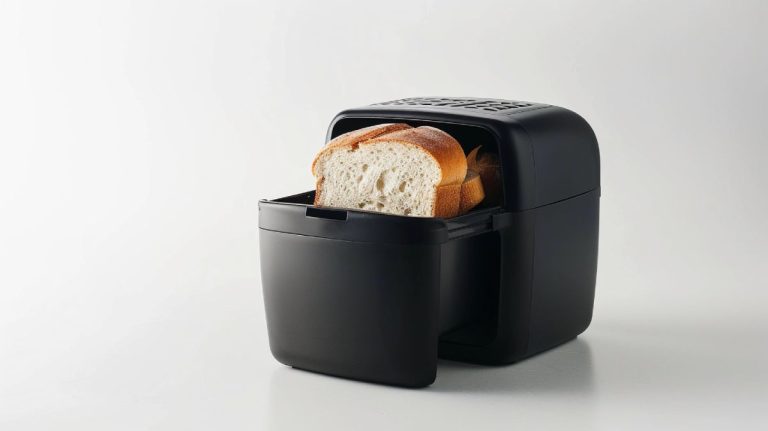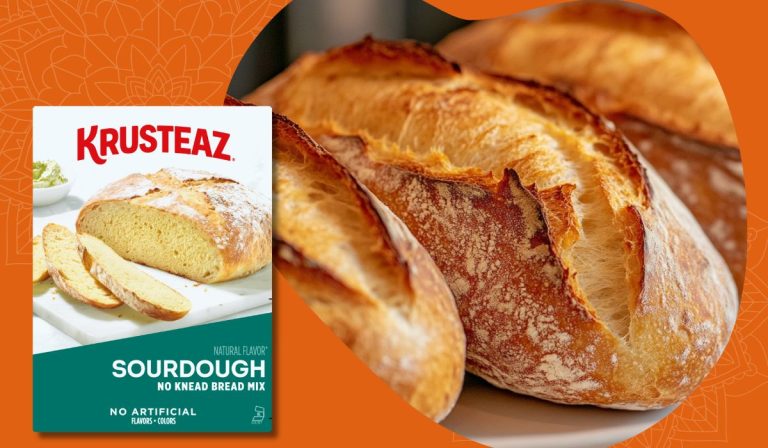Can You Mix Sourdough in a Metal Bowl?
Yes, you can mix sourdough in a metal bowl, especially stainless steel. Many bakers prefer it because it offers a non-reactive surface that won’t alter the dough’s flavor during fermentation.
Stainless steel is durable and easy to clean, making it practical for frequent use. However, avoid using reactive metals like aluminum or copper, as they can hinder yeast activity. While mixing, make certain to clean the bowl regularly to maintain hygiene and prevent any contamination. Understanding the pros and cons of different materials can enhance your sourdough baking experience.
Key Takeaways
- Yes, you can mix sourdough in a metal bowl, with stainless steel being the preferred choice for its non-reactive properties.
- Stainless steel bowls are durable, easy to clean, and resistant to rust, making them ideal for frequent use in sourdough preparation.
- Avoid using reactive metals like aluminum or copper, as they can cause off-flavors and negatively impact yeast activity during fermentation.
- While mixing in metal bowls is fine, avoid prolonged storage of sourdough in them to maintain flavor integrity.
Overview of Mixing Bowls
When choosing a mixing bowl for sourdough, it’s vital to evaluate the material’s properties, as stainless steel offers durability and a non-reactive surface that suits the fermentation process. A stainless steel bowl is ideal for metal mixing, providing a robust option that withstands rigorous use. Its non-porous nature means it won’t retain residues after washing, ensuring cleanliness—an essential aspect when baking sourdough.
While some bakers worry about the acidity of sourdough reacting with certain metals, stainless steel is generally safe for short-term mixing. This makes it a popular choice in both home and commercial baking environments.
Compared to ceramic bowls, which retain heat better and can be advantageous in cooler settings, stainless steel bowls offer easier cleaning and resist staining.
When evaluating your options, consider the pros and cons of each material. For instance, while glass bowls also present non-reactive properties, they lack the lightweight durability of stainless steel.
Ultimately, a stainless steel bowl is a reliable choice for anyone serious about baking sourdough, ensuring an ideal environment for dough preparation.
Benefits of Stainless Steel
Stainless steel bowls consistently offer a range of benefits that make them an exceptional choice for mixing sourdough, including their non-reactive properties and durability. When you’re handling sourdough starter, it’s essential to use materials that won’t interfere with the fermentation process. Stainless steel bowls are non-reactive, guaranteeing the acidity of the dough doesn’t compromise the bowl’s integrity or flavor.
| Benefit | Description | Importance for Sourdough |
|---|---|---|
| Non-Reactive | Doesn’t react with acidic ingredients | Prevents off-flavors |
| Durability | Resistant to corrosion and damage | Long-lasting in frequent use |
| Heat Retention | Excellent at maintaining temperature | Supports ideal fermentation |
| Easy to Clean | Smooth surface prevents food residue retention | Guarantees hygiene during mixing |
Additionally, their lightweight nature makes them easy to handle, helping you efficiently transfer dough. By choosing stainless steel mixing bowls, you’re making a practical decision that enhances both the preparation and quality of your sourdough. These attributes contribute considerably to a successful baking experience, allowing you to focus on perfecting your craft.
Historical Context of Metal Use
The historical use of metal utensils in baking reveals notable challenges, particularly regarding their reactivity with acidic doughs like sourdough, which often resulted in off-flavors and compromised quality. Early baking practices utilized iron and tin, but these metals interacted negatively with the acids in sourdough, impacting flavor and texture. This prompted bakers to seek alternatives that wouldn’t interfere with their doughs.
With the advancement of materials, stainless steel emerged as a safer option for mixing and storing sourdough. Unlike aluminum and other reactive metals, stainless steel notably reduced health concerns. However, not all stainless steel is created equal; higher-grade compositions, such as 18/10, offer better durability and decreased reactivity, making them ideal for baking.
The shift from reactive metals to stainless steel reflects an evolving understanding of how materials interact with sourdough fermentation. While some bakers still use ceramic bowls, stainless steel remains a preferred choice due to its non-reactive properties. This historical context underscores the importance of selecting the right materials—ensuring that the quality of your sourdough isn’t compromised by the tools you choose.
Reactivity of Metals With Sourdough
Understanding how different metals react with sourdough is essential for achieving the ideal flavor and texture in your baking. The reactivity of metals can greatly influence your results. For instance, sourdough is acidic, and using metals like aluminum or copper can lead to unwanted reactions. These metals may react with the acids in the dough, causing off-flavors or discoloration that you definitely want to avoid.
On the other hand, stainless steel is generally safe for mixing sourdough. It’s non-reactive with acidic ingredients, making it a preferred choice for many bakers. When you choose high-grade stainless steel, such as 18/10, you minimize the risk of corrosion or negative interactions because it contains fewer reactive alloys.
While short-term contact with metal utensils is usually fine, it’s wise to avoid prolonged storage of sourdough in reactive metals to prevent adverse chemical reactions.
Community feedback supports the use of stainless steel for mixing sourdough, with bakers reporting successful results without any negative impact on flavor. So, when you’re mixing your sourdough, stainless steel is the way to go for ideal outcomes.
Quality Variations in Stainless Steel
Quality variations in stainless steel directly impact the performance and longevity of your mixing tools, influencing both the safety and taste of your sourdough. Not all stainless steel is created equal; higher-quality options, such as 18/10, contain 18% chromium and 10% nickel, which offer superior resistance to corrosion and reactivity. In contrast, lower-grade stainless steel like 18/0 is more prone to rusting and may react negatively with the acid in the sourdough.
Using a metal bowl made from lower-quality stainless steel can lead to unwanted off-flavors and potential safety concerns due to leaching. While 18/8 stainless steel is generally safe, it’s important to avoid cheaper alternatives when mixing your dough. Selecting reputable brands guarantees you get durable stainless steel utensils that maintain their integrity over time.
The non-reactive nature of quality stainless steel is vital for successful sourdough preparation, allowing you to focus on the fermentation process without worrying about contamination or flavor alteration. Investing in high-quality stainless steel tools not only enhances your baking experience but also assures the best results for your sourdough.
Personal Experiences From Bakers
Many bakers find that using stainless steel bowls not only enhances their mixing experience but also guarantees the integrity of their sourdough, as personal anecdotes frequently cite the absence of off-flavors or reactions. From scientific evidence, it’s understood that stainless steel is non-reactive, making it an ideal choice for acidic bread dough like sourdough.
Bakers often report that mixing in metal bowls allows for efficient kneading and blending of ingredients. The sturdy construction of these bowls provides stability during the mixing process, which can be particularly beneficial for those who work with high-hydration doughs.
Many users also appreciate the ease of cleaning stainless steel, which adds to their practical appeal. While some bakers prefer glass or ceramic bowls for long-term storage, they consistently favor metal bowls for the actual mixing phase.
However, caution is advised against using aluminum or copper, as these materials can introduce undesirable flavors into your sourdough. Overall, the consensus among bakers is clear: stainless steel metal bowls are a reliable and effective choice for mixing sourdough, ensuring that your bread turns out as intended without compromising flavor or quality.
Best Practices for Mixing
When mixing sourdough, using a stainless steel bowl is your best bet due to its non-reactive nature and ease of cleaning.
However, experimenting with alternative materials can reveal how different properties affect temperature retention and dough behavior.
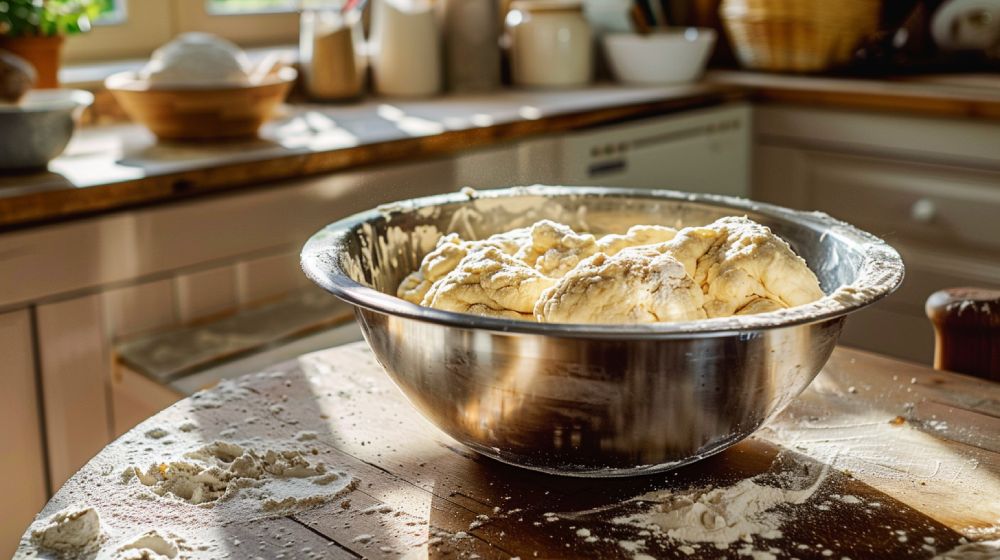
Stainless Steel Suitability
Choosing a high-quality stainless steel bowl for mixing sourdough guarantees a non-reactive environment that preserves the dough’s flavor and integrity.
Stainless steel bowls, particularly those made from 18/10 stainless steel, are ideal due to their superior corrosion resistance. This quality guarantees they last longer and maintain their performance over time.
The smooth, non-porous surface of stainless steel prevents residues from being trapped, making for easy cleaning after mixing. In contrast, older metal materials like aluminum or copper can react with the acidic components of the dough, potentially introducing off-flavors that compromise the final product.
Additionally, stainless steel bowls excel at retaining heat, which can be beneficial when mixing in cooler environments. Maintaining an ideal dough temperature is essential for effective fermentation and overall quality.
Alternative Mixing Materials
Exploring alternative mixing materials can enhance your sourdough experience, as each type offers distinct benefits that impact dough development and fermentation.
While metal, specifically stainless steel, is a durable and non-reactive option, you might also consider glass and ceramic bowls.
Glass bowls provide visibility, allowing you to monitor dough consistency easily. However, keep in mind that glass can cool faster than metal, potentially lowering your dough’s temperature during mixing. This could affect fermentation rates, especially in cooler environments.
On the other hand, ceramic bowls excel at retaining heat, creating a stable mixing environment. This feature can be particularly beneficial if you’re working in a chilly kitchen, as it helps maintain your dough’s warmth, promoting better fermentation.
While wooden bowls are a traditional choice, they may impart flavors that aren’t always desirable and can pose cleaning challenges.
Plastic bowls, due to their porous nature, are best avoided as they can retain residues that negatively impact dough performance.
Alternative Materials for Mixing
Many bakers opt for alternative materials like glass and ceramic for mixing sourdough, as these options can mitigate concerns about acidic reactions and enhance dough handling. While metal bowls, particularly stainless steel, are durable and non-reactive, the potential for interaction with sourdough’s acidity often leads bakers to seek alternatives.
Ceramic bowls, for instance, are excellent at retaining heat, which can be advantageous in cooler environments. This helps maintain ideal dough temperatures during both mixing and rising, promoting better fermentation.
On the other hand, glass bowls offer transparency, allowing you to monitor dough development easily without uncovering the bowl, which can disrupt the fermentation process.
While wooden bowls are sometimes preferred for traditional recipes due to their unique flavor contributions, they require more maintenance to avoid oil and odor absorption.
Plastic bowls, although lightweight and affordable, are less suitable for sourdough because their porous nature can lead to residue retention.
Maintenance of Mixing Equipment
Maintaining your mixing equipment is vital for guaranteeing the best results when working with sourdough, especially when using metal bowls that require specific care to prevent corrosion and preserve their performance. Regular cleaning is essential; use a non-abrasive cleaner to avoid scratching the surface, which can harbor bacteria. Always inspect your metal bowls for signs of rust or damage before use, as compromised surfaces can contaminate your dough and negatively affect your baking results.
Here’s a quick maintenance guide to keep your metal bowls in prime condition:
| Maintenance Task | Frequency | Notes |
|---|---|---|
| Clean the bowls | After each use | Prevents rust and staining |
| Inspect for corrosion | Before each use | Guarantee no damage that could affect dough |
| Store in a dry place | Always | Prevent moisture accumulation and rust |
| Use non-abrasive cleaner | Always | Protects the finish and prevents scratches |
| Avoid prolonged storage | When not in use | Prevents reactions with sourdough starter |
Community Insights and Recommendations
Bakers consistently favor stainless steel bowls for sourdough mixing due to their durability and non-reactive properties, which enhance both the mixing process and dough hygiene. Many users report successful mixing experiences in these steel bowls, highlighting their ease of cleaning and maintenance. When you choose stainless steel, you can make sure your mixing environment remains hygienic, promoting better fermentation.
However, community discussions caution against prolonged storage of sourdough in metal bowls, particularly with acidic ingredients. This could lead to potential reactions that might adversely affect the dough. Users strongly recommend avoiding aluminum or copper bowls, as metal ions in these materials can inhibit yeast activity and compromise fermentation.
Some bakers encourage experimentation with various bowl materials, such as glass or ceramic, to observe differences in dough behavior. This exploration can help you understand how each material affects the fermentation process and dough to rise.
Frequently Asked Questions
Is It Okay to Mix Bread in a Metal Bowl?
Mixing bread in a metal bowl is generally okay; stainless steel bowls won’t react with your ingredients. They’re durable, easy to clean, and effective for dough preparation, though avoid aluminum or copper due to potential reactions.
Will Sourdough Rise in Stainless Steel Bowl?
Yes, sourdough will rise in a stainless steel bowl. Stainless steel is non-reactive and maintains temperature, ensuring ideal fermentation conditions. Its non-porous nature also helps prevent residue, promoting a clean environment for your dough.
Can You Mix Batter in a Metal Bowl?
Yes, you can mix batter in a metal bowl. Stainless steel is non-reactive and durable, ensuring consistent temperatures and smooth mixing surfaces. Just avoid aluminum for acidic batters to prevent unwanted taste alterations.
What Type of Mixing Bowl Is Best for Sourdough?
When choosing a mixing bowl for sourdough, consider stainless steel for durability, glass for visibility, or ceramic for heat retention. Avoid aluminum; it reacts with acidity, compromising your bread’s flavor and quality.
Baking with a Twist: Embrace Your Metal Bowl and Bake Boldly
So, if you’re itching to mix your sourdough in a metal bowl, go ahead—just don’t expect a Michelin star.
While stainless steel is more than capable, some purists might clutch their wooden spoons in horror.
Sure, it won’t ruin your bread, but why risk your culinary reputation?
In the end, whether you’re wielding metal or wood, it’s the love and patience you pour into that dough that truly counts.
Happy baking, you daring rebel.

